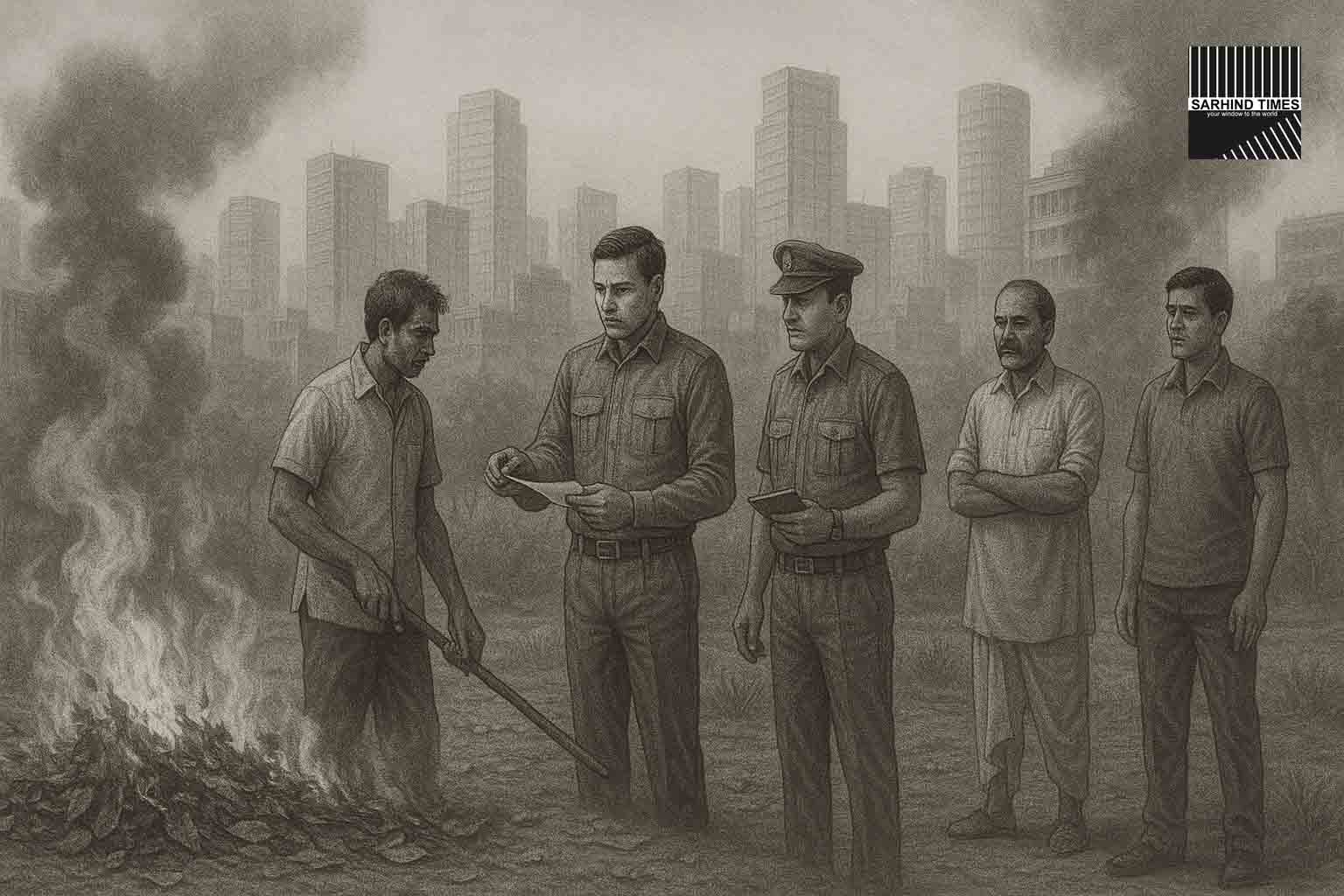Gurgaon, September 28 (Sarhind Times Bureau):
The Municipal Corporation of Gurgaon (MCG) has rolled out an aggressive crackdown against open burning of municipal and horticulture waste, a practice that has long been identified as a major contributor to the city’s deteriorating air quality during the winter months. Under the new enforcement order, offenders will face a penalty of ₹5,000 per violation, while civic officials have been warned of strict administrative action if they fail to enforce the rules.
This initiative, launched just ahead of the city’s high-pollution season, signals the seriousness of the authorities in addressing toxic smog that envelops Gurgaon every winter and makes it one of the most polluted urban zones in the world.
The Problem: Open Waste Burning and Winter Smog
Every winter, Gurgaon and its adjoining regions in the National Capital Region (NCR) face a deadly cocktail of air pollution. Vehicle emissions, industrial activity, crop residue burning in neighboring states, and open waste burning combine to push the city’s Air Quality Index (AQI) into the ‘Severe’ category.
While stubble burning in Punjab and Haryana often grabs headlines, local sources of pollution such as burning of horticulture waste, dry leaves, and garbage in open plots and market edges are equally dangerous. The smoke generated releases high levels of PM2.5 and PM10 particles, which penetrate deep into the lungs and bloodstream, causing respiratory diseases, cardiovascular stress, and long-term health issues.
Environmentalists argue that waste burning contributes to “micro-pollution hotspots” that collectively degrade the entire NCR’s air.
The Enforcement Strategy
The MCG has outlined a multi-pronged enforcement strategy:
- Surprise Checks: Sanitary Inspectors will conduct surprise inspections across key hotspots, including vacant plots, construction corridors, market peripheries, and garbage collection points.
- Fines: A ₹5,000 penalty will be levied on individuals, RWAs, market associations, or organizations found burning waste.
- Accountability: Senior officials have been warned that failure to enforce these measures will invite administrative action.
- Compliance Monitoring: Weekly compliance reports will record challans issued and fines collected to track progress.
- Community Reporting: Residents can use designated helplines to report waste-burning incidents for immediate response.
Officials confirmed that public announcements, signage, and awareness campaigns will run in parallel to enforcement to ensure long-term behavioral change.
Reactions from Citizens and Experts
The crackdown has received mixed reactions.
- Environmentalists welcomed it, stating that visible fines are necessary to change behavior.
“We welcome the fines, but this cannot be token enforcement. Night-time burning and construction site violations must be prioritized,” said Sunita Narain, a noted environmental activist.
- Residents’ Welfare Associations (RWAs) expressed cautious optimism.
“We support the move, but the MCG must also provide proper waste collection services. Residents burn waste when no alternative exists,” said the president of a Gurgaon RWA.
- Market associations asked for clarity.
“Small vendors often burn trash because dustbins are not available. Penalties without infrastructure will create resentment,” a market leader commented.
Broader Context: NCR’s Struggle with Pollution
This crackdown in Gurgaon mirrors similar measures taken by civic agencies across Delhi-NCR. The Commission for Air Quality Management (CAQM) has repeatedly urged municipalities to act locally, arguing that even small-scale fires contribute significantly to winter smog.
In past years, Gurgaon’s AQI has crossed 500 in peak November-December weeks, forcing school closures, construction bans, and restrictions on vehicular movement under the Graded Response Action Plan (GRAP).
Health experts note a sharp spike in hospital admissions for asthma, bronchitis, and cardiovascular distress during this period. Doctors at Medanta and Artemis hospitals in Gurgaon say outpatient cases for respiratory illness rise by 20–30% during smog peaks.
The Way Forward
Experts suggest that enforcement must be combined with structural solutions:
- Strengthen waste collection systems to reduce resident temptation to burn garbage.
- Deploy bio-decomposers for horticulture waste.
- Introduce night-patrol squads to curb after-dark burning.
- Use drones and AI surveillance to identify hotspots quickly.
- Partner with RWAs and schools for citizen awareness campaigns.
Ultimately, enforcement will succeed only if alternatives are available.
Lessons from Other Cities
- Delhi: Uses drones to monitor waste-burning in outer districts.
- Chandigarh: Runs an incentive program for residents reporting violators.
- Singapore: Combines strict fines with 24/7 waste management infrastructure.
Gurgaon could adapt these best practices to make its crackdown sustainable and effective.
Conclusion
The MCG’s latest order represents a serious intent to tackle a chronic problem. Whether it succeeds depends on consistent enforcement, citizen cooperation, and infrastructure improvements.
With the festive season around the corner—and with it, fireworks, construction, and stubble-burning—the city cannot afford complacency. A “cleaner, safer Gurgaon” will remain a slogan unless policies translate into visible, lasting change.
For now, the city waits to see if this crackdown is just another announcement—or the start of a true revolution in urban environmental governance.
#Gurgaon #MCG #AirPollution #WasteManagement #CleanCity #Haryana #SarhindTimes #Environment




+ There are no comments
Add yours